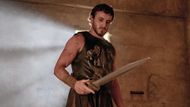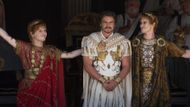Gladiator 2 by Ridley Scott arrived with as much elegance as a Roman chariot crashing into a mob. Critics, historians, and viewers found plenty to lament about the film with respect to its plot, the characterizations, historical inaccuracies, political scandals, and general aesthetic quality.
The sequel was meant to wrap up the tale of Maximus’s son, Lucius, but instead left the audience with lingering questions, unfinished storylines, and melodramatic moments that left little to no impression.
It begins with a bloody fight scene intended to create a world of perpetual violence, which introduces Lucius (now known as Hanno in Numidia) and Roman General Marcus Acacius fighting each other in a way that their struggle alone ought to be a story. The film is visually impressive, but the storyline largely revisits motifs of the original, without any new dimension or emotional layers.
Despite excellent fight choreography and good performances by Paul Mescal and Denzel Washington as the anarchic gladiator Macrinus, the screen suffers from poor character work and illogical inconsistencies.
Historians and classicists were especially outspoken, decrying the sloppy storytelling of the film and the outright lack of respect for historical fact, such as having the Romans flipping through newspapers in cafes that would not exist until another millennium.
The political aspect of the film contributed further to the heat, particularly when the Palestinian-Egyptian actress May Calamawy was nearly eliminated without any explanation, presumably because of her vocal support for Palestine amid Israel’s ongoing aggression in Gaza.
Now, let’s unravel the largest unanswered questions and points of controversy in Gladiator 2, both in the plot, character development, and historical inaccuracies, and in politics.
Disclaimer: The article contains the writer's opinions. Reader discretion is advised.
Unpacking the plot of Gladiator 2: Why Lucius’ story feels incomplete

The plot of Gladiator 2 has received plenty of criticism due to all the questions it leaves unanswered, and the emotional payoff that the story produces hardly leaves any mark at all. Lucius is the son of Maximus, who, at an early age, was taken away to Numidia, a long way out of Rome. While he eventually becomes a gladiator, the movie never tells us what made his mother, Lucilla, send him away, how he survived and trained himself in one of the more distant provinces of the Roman Empire. This absence of context makes it extremely out of place to the audience, as the reason behind his journey and change remains vague and vexing.
Many developmental aspects that might have made the audience empathize with the characters have been swept away in favor of flashy action set pieces with little regard to emotional depth in the film.
There is also a little development of the relationship between Lucius and his mother. Their estrangement is unclear, and any scenes that might have revealed family relationships or inner conflict are either too short or absent. This disconnect in the storytelling minimizes the effectiveness of the revenge that Lucius seeks, which feels underdeveloped and undeserved when compared to the original narrative of Maximus.
Furthermore, Gladiator 2 does not show the plot of Lucius as a warrior, skipping over his maturing and military training in the name of spectacle, and making the viewer unattached to his inner world. All in all, the half-finished treatment of the backstory of Lucius diluted the emotional appeals and character-based narrative that had been the strengths of the original Gladiator.
This lack of progression, absence of family background, and fast-tracked plot render Gladiator 2 less fulfilling and leave most viewers baffled and not invested.
Character development and casting controversies

The character growth in the film Gladiator 2 fell somewhere between lukewarm and disappointing, as critics noted that several major actors were unmotivated, and this is what exacerbated the narrative shortcomings of the movie.
Lucius by Paul Mescal largely escaped these problems, with the actor credited with introducing depth and dramaticism to his role, but the remainder of the cast did not receive the same level of attention, with some characters coming off as half-baked.
Macrinus, the role portrayed by Denzel Washington, was a polarizing figure; some critics admired the star power and raw intensity that the actor brought to the scene, while others saw him as confusing and inconsistent. His motives and backstory were sketched too lightly, which made him look more like a chaotic force of nature than a fully realized person. Likewise, the American accent of Washington sometimes did not sit well with the ancient Roman surroundings, pulling some audiences out of the time entirely.
Controversies in casting complicated matters further, especially surrounding May Calamawy, whose near-total exclusion from the film sparked an uproar. Calamawy, a Palestinian-Egyptian actress, was initially assigned a key role, but was allegedly cut because of political pressure after her vocal support for Palestine in 2023.
However, Gladiator 2 producer Douglas Wick defended the move in conversation with The Hollywood Reporter:
“Even as we are, we’re a long movie. So, yeah, very simply, it can’t be longer, and you have to see what works and what’s essential. Connie had a wonderful [deleted] scene where she basically said goodbye to [Pedro’s character’s] corpse, so you just always have to make choices about what’s essential.”
Further criticism was of how the returning characters of the original film were sidelined or underused, leaving its audience disappointed, who wanted to see continuity and growth in familiar faces.
The sequel tended to prioritize spectacle and flashy new characters over the resolution of old arcs or the development of meaningful relationships, which made the audience investment weak and made the story feel unbalanced.
Historical inaccuracy: “Total Hollywood bullsh*t”

The classics professor of the University of Chicago, Dr. Shadi Bartsch, referred to the historical shenanigans in Gladiator 2 as being “Total Hollywood bullsh*t.” It is important to note that Dr. Bartsch authored numerous books on ancient Rome. In her comment, she was referring to the scene where a submerged Colosseum is full of sharks, according to THR. She further added:
“I don’t think Romans knew what a shark was.”
Historians and classicists jumped at the movie because it threw ancient Rome out the window and carried an ahistorical, sensationalized version of the story that was more a Netflix fantasy than a historical epic.
Some of the most glaring errors were anachronisms, such as Romans reading newspapers in cafes, which were not available in 180 A.D. Hence, it immediately dismissed any sense of historical plausibility. Dr. Bartsch further tells THR:
“They did have daily news — Acta Diuma — but it was carved and placed at certain locations. You had to go to it; you couldn’t hold it at a cafe. Also, they didn’t have cafes!”
The film also oversimplified the key social, political, and military organization of the Roman Empire, making experts shake their heads at the shallow and stereotypical look of the same. The critics also pointed out that the movie omitted the true ethnic richness of the Roman world, diluting the legacy of significant historical figures and substituting subtlety with dull generalizations.
This not only deprived the film of its educational value, but the immersive aspect of the storytelling that made the original Gladiator feel like a real, breathing world was also eroded.
Plot holes and logical inconsistencies

Gladiator 2 also received a blow to a mishmash of plot holes, logical inconsistencies that baffled the average viewers and hardcore fans alike.
An obvious problem was Lucilla’s imprisonment, treated with the precision of a sword fight in the dark: Key figures simply slide in and out of heavily guarded areas with ridiculous ease, and the film never demonstrates how a political heavyweight can be so poorly guarded.
Fights and so-called tactical moves contributed to the headache, as they depicted characters bypassing armies without repercussions, making Roman military campaigns look like a logic-free playground.
The audience also flagged hasty character choices, such as the abrupt transition of Lucius into a gladiator and learning to fight within a flash. Any form of training or character growth was discarded, leaving emotional development to rot on the cutting-room floor. Attempts to connect the sequel to the original Gladiator were further complicated by conflicting timelines and character relations.
All these shortcomings added up to the impression that Gladiator 2 was more about spectacle than good storytelling.
Also: This one change in Gladiator 2 could have made it live up to the legacy of the original 2000 film
Love movies? Try our Box Office Game and Movie Grid Game to test your film knowledge and have some fun!
